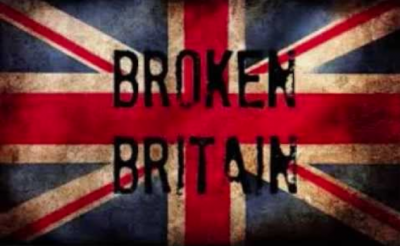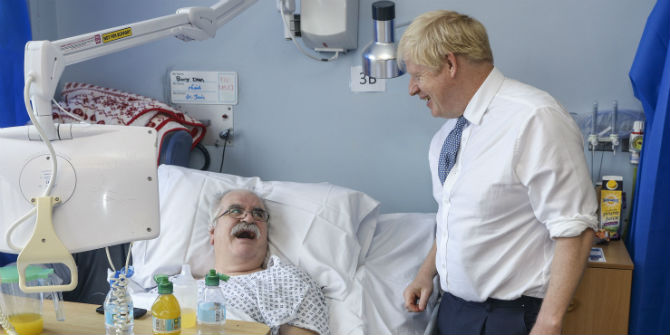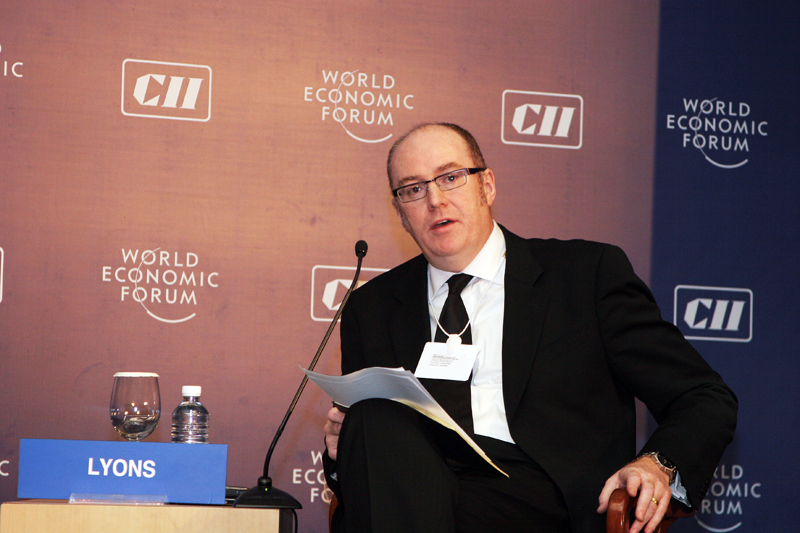Why No-deal Brexit Is a Battle for the Soul of Our Nation. “Boris Johnson’s Lies Would make Pinocchio Blush”

We are careening towards the most extreme form of Brexit imaginable – flouncing out of the European Union (EU) after 46 years without any transition plan. Operation Yellowhammer, a leaked secret report from the government’s own officials predicted that the most likely outcome of this no-deal Brexit would be shortages of medicines and fresh foods, civil unrest and transport chaos. In short, the most vulnerable people will suffer terribly. Many will die.
Boris Johnson is a man who clawed his way to power through the votes of a mere 0.13 per cent of the population. His lies are so profuse and extreme they would make Pinocchio blush. During the 2016 Brexit referendum, he was driven around in a big red bus plastered with false claims about how much money Britain gave to be a member of the EU. The numbers were so wrong, the UK’s chief statistician had to refute them – the best estimates find that Britain gets economic benefits from being in the EU that are about ten to twenty times as large as the financial cost of membership (see box on “the economics bit” below). Like so many populists, Johnson is a son of the wealthy privileged elite, who promises nirvana to a polarised country weakened by decades of stagnant wages and austerity. And like so many in the rabidly Eurosceptic UK media, his journalistic career was made from fabricating stories about European regulations. He was sacked not once, but twice by his editor for lying.
Johnson has no political compass except his preening ambition.

Boris Johnson visits Pilgrim Hospital in Boston. Photo: Number 10 via a CC_BY-NC-ND 2.0 licence
The transparent ploy of his government is to pretend to seek a new deal, while running down the clock to October 31st. Brexiters demand the elimination of the “Irish backstop”, which is the insurance policy to prevent the return of a hard border in Ireland in the current withdrawal agreement. However, three years of intense discussion and negotiation have shown that although there are plenty of alternatives (such as staying within the single market like non-EU Norway), none of these solutions satisfy the numerous other demands of the Brexiters.
Why a no-deal Brexit is so profoundly undemocratic
The mantra of the no-dealers, played on “bleat and repeat” in the supine mass media, is that we must “respect” the vote and leave for the sake of democracy. But it needs shouting throughout the land: There is no mandate for a no-deal Brexit.
The idea that the UK would crash out of the EU was not on the 2016 ballot paper. Johnson himself said that chances of no deal were a “million to one.” The country was split down the middle by the vote with two of the four nations of the UK voting to remain – Scotland and Northern Ireland. Polling now consistently puts Remain ahead of any sort of Leave, let alone its most extreme form. This is hardly surprising as now the public are more aware of what Brexit actually means.
Since few voters wanted or want a no-deal style Brexit, why should the suicide cult minority who do clamour to crash out of the EU, dictate to the majority? Should they be able to thrust their twisted ideology down the unwilling throats of the people?
Parliament has voted consistently to block a no-deal Brexit. Consequently, Johnson has come up with a clever new wheeze – simply dissolving the legislature in advance of the Brexit deadline, so Members of Parliament cannot stop it, no matter what. The last time this happened was when King Charles did it in the 1640s, which sparked the English Civil War and resulted in a beheading.
It is clear that the gang who rule Britain have no real respect for democracy. It is simply nauseating that they will stop at nothing to advance their agenda.
How did we get here?
The EU has been a force for peace between nations who were at war for millennia. By building the largest single market on planet Earth, it has enabled these warring tribes to trade and grow closer. European countries fight each other over fishing quotas instead of bloody fields. This accomplishment was without blood and battles, but through a growing club who realised that our mutual self-interest lay in cooperation instead of conflict. Britain has been a proud member of this club, helping build the single market and guiding the club’s expansion to help bring prosperity and stability to countries formerly under the yoke of fascism in Southern Europe and Communism in Eastern Europe.
Brexiters are the vanguard of the populist nationalists who hate the EU, because it promotes a rules-based liberal order rather than a tribally based struggle for power. Trump and Putin love a weakened Europe that they can bend to their will. They undermine the international cooperation, which is our only hope to deal with the global challenges humanity faces. No wonder these authoritarians reject policies to tackle climate change. They reject reason, facts and experts. They want to return to a nativist world based on gut instinct, where civility is overruled by the mob, manipulated of course by the iron fist of the demagogue.
Why Brexit is so financially painful

The no-deal crisis matters viscerally, as crashing out will hit hard. However, even after the adjustment when medicines and food supply chains recover, the worst is yet to come. Johnson has been promoting his economic lackey, Gerard Lyons (image on the right, from Wikimedia Commons), to head the Bank of England and therefore end its political independence. Lyons admits that no-deal Brexit will cause pain, but believes in a “Nike Swoosh” recovery. But the true picture will be one of a “dead cat bounce”. There will be a temporary recovery after the No-Deal chaos subsides, but then the inevitable relative economic decline will kick in making Britain poorer than it would been if we remain.
The economics of Brexit are almost trivially easy, which is why there is near-universal agreement among experts that Brexit will cost us dear. Trade costs rise with our closest neighbours from both tariffs and regulatory divergence, so trade will fall. Since the lesson of human development is that trade makes us average richer, Brexit will make us poorer. And the more extreme is the form of Brexit, the bigger is the fall of trade and income. The gory details and spurious counter-arguments are in the box below.
The pain will accumulate gradually. Brexit is a cunning domestic abuser of the economy. He hits us where the bruises do not show easily – it will be a gradual accumulation of financial pain over many, many years. Johnson will not be able to hide the violent assault of a No Deal. However, when the economic police are called, he will inevitably blame our nosy European neighbours, doubtlessly recording it on their iPhones. Alternatively, it will be the traitors within who are the enemies of the people.
We can argue over the exact magnitude of the Brexit pain. My best guess is that after a decade or two, British national income per head will be a tenth smaller under a no-deal Brexit than it would be if we remain in the EU.
Ten per cent of GDP sounds anodyne – is a loss of £200 billion per year a manageable number? Ten percent off public services means 11,000 fewer hospital doctors, almost 3,500 fewer GPs and 31,000 fewer nurses. Therefore, less diagnosis and treatment, longer waiting times and more people living in more pain. It means 12,600 fewer police – more crime, fewer clear-ups and more misery. It means 45,000 fewer teachers – bigger classes, less learning and more failure before kids’ lives have even begun.
Please do not tell me that we can avoid the cuts to the NHS because we can take bigger cuts elsewhere. Fewer cuts to the NHS mean more cuts elsewhere.
Instead of cutting services, could we just raise tax? Offsetting a £82 billion less public spending means increasing the basic rate of income tax by another 15 pence in the pound. At a time when wages will be stagnating, this will not be a pretty sight.
Let us be generous and say the losses are only half what I think they are – 5 per cent of GDP. This is actually the estimated long-run loss of Theresa May’s deal made by the independent UK in a Changing Europe, a softer situation than no deal. This will mean “only” a £100bn lower income hit so 22,500 fewer teachers and 15,000 fewer nurses.
The bottom line
We have known for a long time that Brexit is an economic disaster and now we also know that undemocratic no-deal Brexit is a political disaster. But it is also a moral disaster. A conscious decision to subject huge numbers to financial misery and see people hurt and die due to loss of public services and economic dislocation is simply unforgivable. Even if no deal were supported by an overwhelming mass of people – and the opposite is the case – it would still be wrong. If your sister were about to start a heroin habit, would you simply shrug and say “well it’s her choice”? Or, would you fight as hard as you could to stop her?
The people and parliament should not allow their rights to be trampled. Despite the looming darkness, we must prevent the assault on truth and democracy that Johnson’s odious regime represents. Britain is in the front line in this global battle.
And remember – it’s not over until it’s over.
Now the economics bit
Even though the economic arguments for EU membership are less important than the political and ethical case, I am a professional economist, so here are a few notes for the interested.
It is abundantly clear that Brexit entails an economic loss. The only real question really is how big the loss will be under different forms of Brexit. The best discussion of this is here, from the politically independent think-tank UK in a Changing Europe.
The conclusions are similar to my pre-referendum analysis as well as the recent Brexit assessments by the government, the Bank of England and NIESR. Indeed, all credible independent studies are in broad agreement that Brexit reduces average incomes, but the softer the Brexit; the lower will be the economic losses. This is why there is such a strong consensus among economists that leaving the EU will economically harm the UK.
The strength of this consensus is similar to that among medical experts about the harm caused by smoking or among meteorologists over the reality of climate change. This is why it is so ridiculous that the BBC and other broadcasters in the name of ‘balance’ give equal prominence to pro-Brexit economists as they do to those reflecting the profession’s opinion. The bulk of the UK press is virulently pro-Leave, so also heavily promotes the motley Brexit crew, whose models have been thoroughly, repeatedly debunked.
Often one hears the refrain that ‘economic forecasts are always wrong’ so should be ignored. A doctor cannot predict the age at which you will die if you start smoking two packets of cigarettes a day, but she is on firm grounds forecasting that your new smoking habit will be bad for your health.
Brexit economic analysis is generally not a forecast of what will be the exact size of the economy post-Brexit, but rather an analysis of the difference in economic outcomes if the UK leaves compared with if the UK remained. Brexit will not abolish the technological progress that the economy has managed to exploit over the last 250 years in order to grow. It will just mean that we are poorer given whatever the state of technology and world demand conditions that emerge over the next few decades.
A variant of the above argument is that economists’ forecasts have all been proven wrong by how well the UK economy grew after the vote in 2016. For example, David Davis, the former Secretary of State for Brexit, said that ‘previous Treasury forecasts had been proved wrong and were based on flawed assumptions’, citing in evidence that the UK economy had grown by over 2.8 per cent in the 18 months since the referendum, whereas the Treasury had forecast it would shrink.
This is an example of wilful misunderstanding. The general prediction was that the economy would grow by 2 per cent less than expected because of Brexit. And in fact, this is broadly what has happened since the vote – the UK economy has slipped from being at the top of the G7 growth league to the bottom. Moreover, observers reckon that GDP per capita is about 2 per cent lower than expected due to the Brexit vote.
It is true that economists thought that there would be a bigger immediate hit from the Brexit vote, whereas it took a few quarters before the economy started to slow down significantly relative to other countries. Therefore, although the forecasts got the overall hit about right, they got the timing wrong.
There were probably two reasons for this. First, modelling assumed that the negative immediate impact would come from the rational expectations of consumers of lower future real income growth. However, many people actually believed the propaganda on the Leave side that there would be no economic fallout from Brexit, so they continued spending much as before. It was only gradually when reality dawned that consumer confidence took a knock (for example, when the large fall in the value of sterling started to feed through into higher food prices and more expensive foreign holidays).
The second reason was that the Treasury analysis assumed that Article 50 would be activated immediately, whereas it was nine months later when Theresa May did this. The slowdown of the economy followed this as uncertainty started to spike.
Finally, it is worth pointing out Brexit has not yet happened. The majority of work, including my own, focuses on what happens after Brexit occurs, which is currently slated to be after the ‘transition period’ ends in 2020. Negative effects now are due to expectations about what might happen in the future, and these are notoriously hard to model.
The trouble will really start when true Brexit hits the fan.
*
Note to readers: please click the share buttons above or below. Forward this article to your email lists. Crosspost on your blog site, internet forums. etc.
This post represents the views of the author and not those of the Brexit blog, nor LSE. It first appeared at LSE Business Review.
John van Reenen is a professor at MIT’s department of economics and Sloan School of Management. From October 2003 to July 2016 he was professor of economics and the director of the Centre for Economic Performance (CEP) at LSE. He has published widely on the economics of innovation, labour markets and productivity. In 2009 he received the Yrjö Jahnsson Award, the European equivalent to the US Bates Clark Medal, awarded every two years to the best economist in Europe under the age of 45. In 2014 he won the European Investment Bank prize for excellence in economic and social research.
Featured image is from TruePublica

